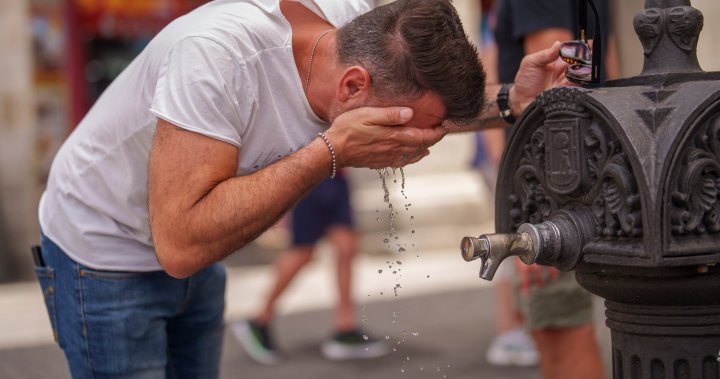The World Health Organization (WHO) is encouraging countries to set up a “strong surveillance system” to aid those most vulnerable to the health risks of extreme heat, which include heat stroke and exhaustion.
The most vulnerable include those with cardiovascular and respiratory diseases and diabetes, as well as older people, pregnant people, children and those who are homeless, according to the WHO.
The WHO did not respond to Global News’ request in time of publication to clarify what it meant by a surveillance system, but a 2021 report from the United Nations agency on heat and health in Europe said that “active surveillance” includes identifying susceptible subgroups through health system and population registries.
It gave the example of Italy’s Homeless Housing and Assistance Program (HHAP) formally requiring the drawing up of lists of susceptible subgroups, which are then sent to health authorities to implement active surveillance by general practitioners (GPs) and social services.

“We are very concerned about those who are more vulnerable,” Maria Neira, director of the public health, environment and social determinants of health department at the WHO, said during a press conference Wednesday.
“As an emergency, each government, local, central, they need to look at a very strong surveillance system to make sure that we protect all of those people potentially at risk immediately.”
Neira said that hospitals need to be prepared as high heat can exacerbate health issues.
The recommendation comes as parts of Europe, Asia and the United States are experiencing heat waves, with the hottest day on record hitting two weeks ago, according to WHO. The past two weeks in July have broken global temperature records and June was the warmest the month has ever been globally.
Neira also pointed out that urban planning is fundamental to battle the higher temperatures, as in making sure people have a cool place they can go if their home can’t be cooled.
“We will need places on a city-level for people to have a kind of climate refuge,” she said.
While heat has been the main issue for some places, others are facing other natural hazards, including heavy rains in South Korea and flash floods and landslides in northern India that have killed more than 100 people since June 1.
Climate change has been found to be a factor in erratic weather patterns, with Neira calling for more action to be taken.
“In the medium and long term, we need to decarbonize our society as well,” she said.
– with files from Reuters
A man rests during a hot and sunny day of summer in Madrid, Spain, Wednesday, July 19, 2023. Most of Spain is under alert for high to extreme heat with forecasts calling for peak temperatures of 43 C (109 F). (AP Photo/Manu Fernandez).
© 2023 Global News, a division of Corus Entertainment Inc.




